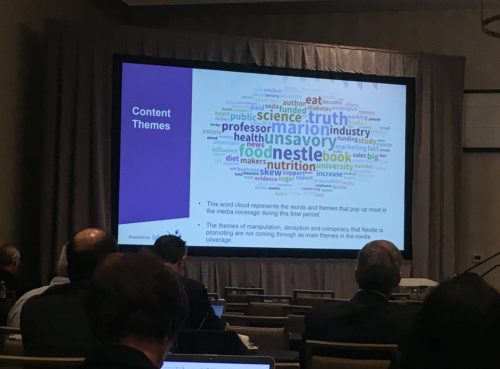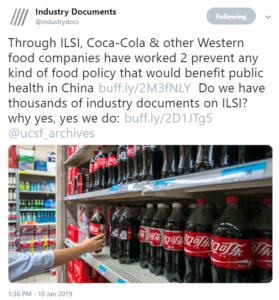ILSI tracked media responses to my book, Unsavory Truth

This photo was just sent to me by Murray Carpenter (@Murray_journo). I don’t know him personally but he is the author of Caffeinated, which I blurbed and wrote about in 2014.
He wrote that ILSI, a well known front group for the food industry, must have hired someone to track media reception to my 2018 book, Unsavory Truth: How the Food Industry Skews the Science of What We Eat. ILSI is the International Life Sciences Institute, which has since changed its name to the Institute for the Advancemement of Food and Nutrition Sciences.
Murray said that on January 19, 2019, he was in the audience for the annual ILSI conference in Clearwater, Florida. He sent me this account of that occasion [my emphasis in red below]:
As the conference ground on, attendance fell off. So there were plenty of empty seats when Clare Thorp took the podium. Thorp had newly assumed the position of executive director of ILSI North America. She talked about scientific integrity ad nauseam. The emphasis seemed a corrective, an effort to reinforce the message among the membership. Because for an organization that prides itself on independence and integrity, ILSI kept getting caught doing the bidding of its members, over and over again. It just couldn’t seem to rein itself in.
It wasn’t just that ILSI’s Applebaum, Hill, and Sievenpiper had become the public faces of pseudoscience [Note: scientists caught up in conflicts of interest with Coca-Cola]. Thorp also referenced the Mars situation. The corporation had first criticized ILSI-funded science, then left the group entirely.
“Our membership comes with some major challenges and opportunities,” Thorp said. “We’ve lost a major member. It happens. We keep going.”
Unwittingly, Thorp worked doggedly to prove the aforementioned axiom—the degree to which you have scientific integrity is inversely related to the number of times you claim it.
“I have a passion for sound science…I come from a family of scientists, whether practitioners or academics,” she said. The science statements came out in torrents. “Unbiased and credible research…Scientific integrity is not something we made up overnight, it’s a journey.” She displayed a slide touting the Scientific Integrity Consortium, in partnership with the USDA, which she called “a coalition of the willing.”
“We are not an advocacy or a lobbying organization. But we are actually something entirely different,” she said.
“ILSI is an industry-funded organization where these companies support research that doesn’t directly serve their private interests. They agree to be hands-off…and they bravely commit to publishing the data, no matter what it says. This is very scary. And then, why would they do it?…It’s actually altruistic. They genuinely believe it’s important. They also believe that having a collaborative forum where everyone’s voice can be heard is really necessary.”
But it wasn’t enough to just focus on the science. Thorp also considered the public perception of ILSI. She said she wanted to communicate their work more broadly, to step outside this circle of friends and take a more proactive approach.
“We need to have a better understanding of who ILSI North America is, and what we do, and how we do it.” In response, ILSI was developing more communications materials, she said, and new website graphics.
Then she displayed a slide showing an elaborate, graphically elegant word cloud. Some of the big words in the center of the cloud: “science,” “truth,” “food,” “unsavory,” “industry,” “Nestle,” “Marion.”
It turned out that the nonprofit had chosen to spend some of its money to hire a media tracker to follow the press coverage of Marion Nestle’s recent book Unsavory Truth. The book focused on corporate influence in nutrition policy. The word cloud represented an analysis of the press coverage.
And here, Thorp was actually pleased. “The themes of manipulation, deception, and conspiracy that Nestle is promoting are not coming through as main themes in the media coverage.”
Thorp said that one of ILSI’s challenges was the public perception that it’s an industry front group, and that gets onto the web. “We are working very hard to get our Wikipedia page updated, and then it gets changed again, and then we have to update it again, but it’s important,” she said.
Leading ILSI had become a tough gig. Thorp would not last a year at the helm.
Comment
Of course the word cloud did not include maniputlation, deception, or conspiracy; those words do not appear in Unsavory Truth. The whole point of conflicts of interest induced by food industry sponsorship—which is what the book is about—is that the conflicts are almost always unintentional, unrecognized, and denied. Researchers who take industry funding do not believe it influences their science, despite the overwhelming evidence to the contrary reviewed in my book.
What’s especially interesting to me about this is that from my perspective, Unsavory Truth had little impact. It generated much less media coverage than most of my books, and led to few speaking invitations. I thought it had disappeared without a trace.
Apparently not. I am pleased and honored to learn about this incident.
*******
For 30% off, go to www.ucpress.edu/9780520384156. Use code 21W2240 at checkout.



